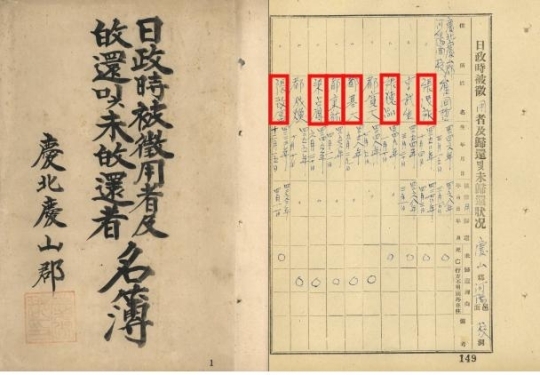Representatives from the ruling and opposition parties urge to grant permanent status for the Commission on Verification and Support for the Victims of Forced Mobilization under Japanese Colonialism in Korea

Amid a series of rulings ordering compensation to forced laborers under Japan’s colonial rule, dozens of documents listing forced laborers were newly found, offering a turning point.
The National Archive announced on November 17 that 67 volumes containing lists of victims from Japan’s colonial rule were discovered in the archival storage of the Korean Embassy in Japan while it was moving to a new location. These books reveal the names of victims who were forced into labor, as well as those killed during the massacre after the Kanto earthquake and the March 1st Independence Movement by Japan. The documents were handed over from the embassy to the Ministry of Security and Public Administration. Currently the National Archive is working to analyze the books and compare them with the government’s previous lists. The archive also attempts to verify the purpose of the lists and a full account of how they were transferred, stored and used.
The data gaining the most attention is the list of forced workers, compiled through a nationwide survey performed by the government in 1952. The new document has now become the oldest, dating at least four years earlier than the list of forced laborers drafted by the then Ministry of Labor in 1957 as grounds for compensation from Japan. Moreover, the new list contains names that are not recorded in the previous list in which the total number of victims stands at 285,183.
The discovery of the new list that includes around 230,000 names offers new opportunity for those who were forced into labor but failed to win compensation due to lack of evidence. 33,000 out of the entire 103,000 people who, until now, reported their case to the Commission on Verification and Support for the Victims of Forced Mobilization under Japanese Colonialism in Korea never received any compensation in absence of evidence. Some in the government estimate that if we put the total number of victims at 3,000,000, verified cases account for only 7.7%, and cases for which financial support was actually provided stay in the mere 3% range.
In response to this, 14 representatives from both the ruling and opposition parties, who are also members of the forum that seeks to discuss means to address the human rights abuse issue by the colonial Japan (Chairman Lee Joo-yeong), held a press conference on November 19 to call for a permanent status for the commission and a thorough investigation into the massacre of Koreans that took place after the Kanto earthquake.
The commission is the only institution engaged in examining the truths of Japan’s brutalities during the colonial rule. Established in April 2010, the commission was to be run until the end of 2012, but the deadline was pushed back twice with consents from the National Assembly. However, with around 40 days left before the termination, it has become a pressing issue to work on follow-up measures.

